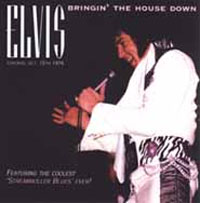Bringin' The House Down
July 01, 2001 | Music
The CD “Bringin' the House Down” is a release from the new label "Only One King" and contains a concert from Chicago, October 15th, 1976. This show was recorded one day after the show on last year’s Chicago Beat CD. it lasts for almost an hour and "C.C. Rider" was not recorded by the sound-engineer.
Design
The cover is a basic import cover with an Elvis concert photo, not from this concert though. The 2 page booklet contains a compilation of various news comments and fact on the October 14 and 15 concerts Elvis gave. A nice read. The CD is 'sold' with the text it contain the "coolest" version of "Steamroller Blues" ever. The sound quality of this recording is good.
Content
The 19000 fans that attended the concert got a good show for 1976. Elvis changed his set list a bit and was focused on the music. The alternations in this concert are "Steamroller Blues" and "Help Me", the rest of the set list is standard. This also goes for most of the performances of Elvis during the concert. He has a fair voice and and is in good spirit and it shows.
As said, most of the concert is standard; the first alternation is on "Don't Be Cruel" on which we get an original break from the drummer and guitar player counting down to the final of the song. In between "Johnny B. Goode", for which Elvis asks James Burton to play the guitar behind his head, and an incomplete "Love letters" (it's faded away and faded back in again for only a few seconds) we get solos from Ronnie Tutt, Jerry Scheff, Tony Brown and Davis Briggs. We've already had the band introductions three tracks earlier. The tracklisting is wrong here too, the producers forgot to separate 'Love Letters" from David's electric piano solo.
And then there is "Steamroller Blues", supposedly the coolest version ever. Well if this is the coolest version, how do we describe other "cooler" versions we have? Not that it's a bad version, but it's not what you might expect looking at the text on the booklet. He didn't perform this song too often in 1976, so it's nice to have it in this set. The same goes for "Help Me", which had a false start because Elvis mixed up the words… but he got out of it with a wit. Conclusion:
It's a nice 1976 show of Elvis in good spirit and a fair voice for 1976. Two tracks are interesting, but not as interesting as this release announced. But being a new label, you have to get some attention with the first release. Our conclusion: a nice debut, but not that special.